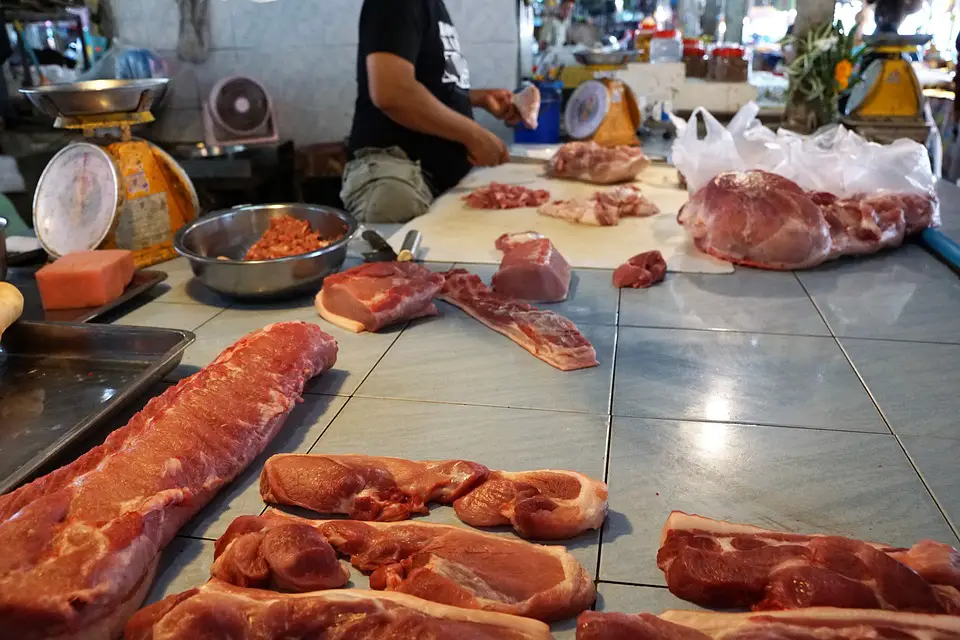
How to say la carnicería meat market in English?
La carnicería is a Spanish term that translates to “the butcher shopping” or “the meat market” in English. It is a common type of store found in many Spanish-speaking countries, where customers can purchase a variety of fresh meats, poultry, and sometimes even fish.
In these stores, customers can find a wide selection of meats, ranging from beef, pork, and chicken to specialty cuts like tripe or offal. Some carnicerías may also offer prepared meats like sausages, marinated meats, and ready-to-cook dishes. The quality and variety of meats available in a carnicería can vary depending on the location, but many customers prefer to shopping there because they can find fresh, high-quality meat at competitive prices.

Latin American Countries
In Latin American countries, carnicerías are often family-owned businesses that have been passed down through generations. These businesses are an important part of the local economy and community, and customers often build long-term relationships with the owners and staff. In many cases, the owners and staff of carnicerías are knowledgeable about different types of meats, cuts, and cooking methods, and can offer advice to customers on how to prepare and cook their purchases.
In the United States, carnicerías can be found in many cities with large Spanish-speaking populations. These stores often offer a mix of traditional meats and cuts as well as products that cater to the specific tastes and preferences of their local community. Many carnicerías also offer a variety of other products like fresh produce, spices, and even prepared foods like tamales or empanadas.
English Speakers
For English speakers, it can be helpful to know how to say “la carnicería” when shopping for meat or looking for a specific type of store. Additionally, understanding the importance of carnicerías in Spanish-speaking communities can help build cultural awareness and appreciation.
In conclusion, “la carnicería” is a term used to describe a butcher shopping or meat market in Spanish. These stores are important in many Spanish-speaking communities and offer a wide selection of fresh, high-quality meats at competitive prices. Understanding the role of carnicerías in these communities can help build cultural awareness and appreciation, and knowing how to say the term in both Spanish and English can be helpful for anyone looking to shopping for meat or explore different types of stores.
butcher shopping – carnicería
the meat market butcher shopping – la carnicería del mercado de la carne
Sentences with the word carnicería in Spanish
| La carnicería está abierta todavía. | – | The butcher shopping is still open. |
| Están vendiendo los huevos en la carnicería. | – | They are selling the eggs at the butcher shopping. |
| Ya fui a la carnicería varias veces y no me tocaba comprar todavía. | – | I’ve already been to the butcher shopping several times and it wasn’t my turn to buy yet. |
| En la carnicería está llena. | – | In the butcher shopping is full. |
| Toda carnicería debería estar abierta al público y con buenas ofertas. | – | Every butcher shopping should be open to the public and with good deals. |
| ¿Qué están vendiendo en la carnicería? | – | What are they selling at the butcher shopping? |
| ¡Oh la carnicería está vacía! | – | Oh the butcher shopping is empty! |
| Mira que tiempo he demorado para comprar en la carnicería. | – | Look how long it took me to buy at the butcher shopping. |
| El carnicero aún no ha llegado a la carnicería. | – | The butcher has not yet reached the butcher shopping. |
| ¿Por qué esta carnicería no tiene pizarra informativa? | – | Why doesn’t this butcher shopping have a notice board? |
| ¿Llegó el pollo a la carnicería? | – | Did the chicken arrive at the butcher? |
| Ya llegó el pavo a la carnicería. | – | The turkey has arrived at the butcher shopping. |
| La rendición de cuentas será frente a la carnicería. | – | Accountability will be in front of the carnage. |
| Cuando llego a esta carnicería, nunca encuentro nada. | – | When I get to this butcher shopping, I never find anything. |
| ¿A qué hora cierra la carnicería? | – | What time does the butcher shopping close? |
| ¿En qué carnicería te toca comprar? | – | In which butcher shopping do you have to buy? |
| Pasa por la carnicería. | – | Go through the butcher shopping. |
| No pases por la carnicería que todavía no tienen el jamón de las navidades. | – | Do not go through the butcher shopping that still does not have the Christmas ham. |
| Cuando pases por la carnicería me avisas. | – | When you pass by the butcher shopping let me know. |
| Esa carnicería hay que cerrarla, nunca tiene nada. | – | That butcher shopping must be closed, it never has anything. |
| Llegó el picadillo a la carnicería. | – | The mincemeat arrived at the butcher shopping. |
| No llega nada a la carnicería desde el mes pasado. | – | Nothing has arrived at the butcher shopping since last month. |
| Lila es la señora que vive al lado de la carnicería. | – | Lila is the lady who lives next to the butcher shopping. |
| ¿Sabes el número de teléfono de la carnicería de la otra cuadra? | – | Do you know the phone number of the butcher shopping on the other block? |
| Cuando vayas a la carnicería, me dices que llegó. | – | When you go to the butcher shopping, tell me it’s here. |
| No vayas a la carnicería, no hay nada. | – | Do not go to the butcher, there is nothing. |
| Llegó la carne de cerdo a la carnicería. | – | The pork arrived at the butcher shopping. |
| El pollo no ha llegado este mes a la carnicería. | – | The chicken has not arrived this month at the butcher shopping. |
| En esa carnicería hay muchos carniceros. | – | In that butcher shopping there are many butchers. |